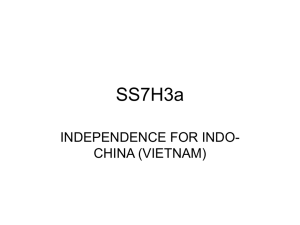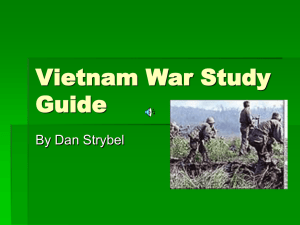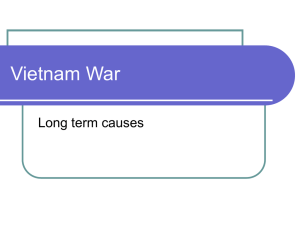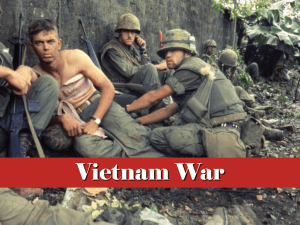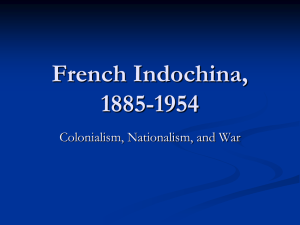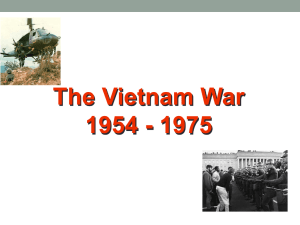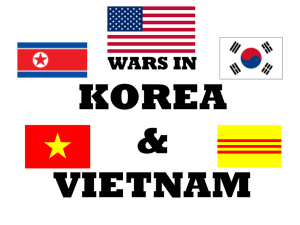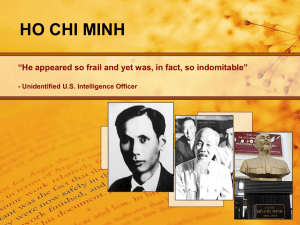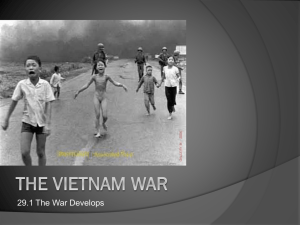Ho Chi Minh Identity summary
advertisement
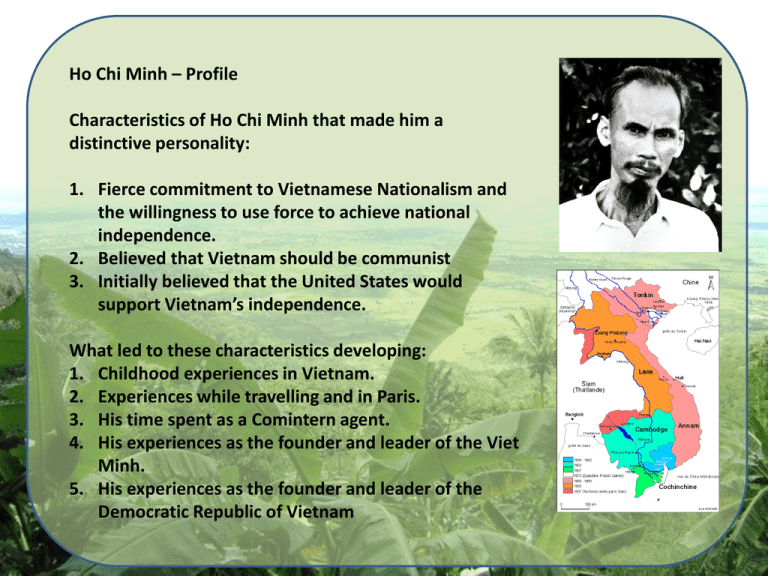
Ho Chi Minh – Profile Characteristics of Ho Chi Minh that made him a distinctive personality: 1. Fierce commitment to Vietnamese Nationalism and the willingness to use force to achieve national independence. 2. Believed that Vietnam should be communist 3. Initially believed that the United States would support Vietnam’s independence. What led to these characteristics developing: 1. Childhood experiences in Vietnam. 2. Experiences while travelling and in Paris. 3. His time spent as a Comintern agent. 4. His experiences as the founder and leader of the Viet Minh. 5. His experiences as the founder and leader of the Democratic Republic of Vietnam Early Life in Vietnam – Birth of a Nationalist • Born in Central Vietnam in 1890 • The French had divided Vietnam into three provinces in 1887. • The French exploited the Vietnamese economically • Malaria, malnutrition and dysentry killed thousands of workers in mines and on rubber plantations. • 90% of Vietnamese were peasants. • Peasants had to cope with tax increases and high What Ho did…. • Became a message rents. runner for the • Ho Chi Minh’s father was a Mandarin (village official). Nationalist • He lost his job after criticising French rule. underground • Ho’s family suffered financially because of this and his movement. father had to become a travelling labourer. • Translated peasant • In spite of this Ho managed to receive a basic complaints about education and demonstrated a gift for languages land to present to (including French) French officials. Ho on the go – International Travels and his time in France. • Ho left Vietnam at the age of 21 to travel. • He worked on an Ocean Liner and visited Africa, England and the Americas before settling in Paris. • In countries like Algeria (another French colony) he saw the indigenous people being exploited. • He became a convert to Lenin’s theory that capitalism leads to the exploitation of colonial people. • Ho Chi Minh converted to Communism and became a member of the French Communist Party. • He also founded a newspaper “Le Paria” which called for an end to French colonialism. • In 1919 he attempted to present his case for Vietnamese independence to President Wilson at Versailles. He was inspired by Wilson’s argument that “Self-determination” should be a principle of the Treaty of Versailles. • Although Wilson refused to meet with him the Soviet Union had noticed his activities. • In 1923 he was summoned to the Comintern by Moscow. “Capitalism needs cheap labour. The reason why colonised people are exploited is because this keeps the cost of production low! By exploiting foreign workers the capitalist can avoid revolution at home (he can afford to pay his own workers more)! Capitalism is the enemy of all colonised people…. Ho: Founder of the ICP and the Viet Minh Ho spent several years founding and leading organisations dedicated to achieving his communist and nationalist goals: • He united the various Communist groups in Indochina to form the IndoChina Communist Party (ICP) in 1930. • Returned to the Soviet Union to train Comintern agents before returning to China in 1938. • In China he issued a statement that called for Vietnamese independence and freedom of assembly, speech and the press. • In 1940 he returned to Vietnam for the first time in nearly 30 years. • The Japanese had seized Indochina and Ho felt that this presented an opportunity to take control of Vietnam. • In 1941 Ho Chi Minh formed the Viet Minh. The Viet Minh pledged to use force to end the Japanese and French rule of Vietnam. • The leadership of Ho and Giap saw this movement grow to a 10,000 guerilla army north of Hanoi. What I did… Formed the ICP to spread communism! Trained Comintern agents in the Soviet Union! Founded the VietMinh to achieved independence for Vietnam! Ho the Founder of a Nation • Under Japanese rule Vietnamese villagers were exploited and any opposition was dealt with brutally (public beheadings). • During the last months of Japanese rule famine spread as the Japanese hoarded rice. • Ho Chi Minh’s Viet Minh recruited large numbers of villagers by promising to “Break Open the Rice Stores to Avert Famine”. • When the United States bombed Nagasaki the Japanese surrendered. • Ho called for a general uprising on August 10 and within 10 days the Viet Minh controlled the country. • On September 2nd 1945 Ho Chi Minh was able to declare the independence of the ‘Democratic Republic of Vietnam”. He quoted from the American Declaration of Independence. During this period the Viet Minh cooperated with the United States in its war with Japan. The USA provided the Viet Minh with radios for communication and the Viet Minh returned American pilots to their bases in China. The return of the French and descent into war • • • • • • • • Ho Chi Minh’s plans to secure Vietnamese independence failed to be realised. The Allies (USA and Britain) had already agreed that France would return to rule Indochina. The USA needed a united Western Europe to stand against the Soviet Union. Britain did not want the power of European empires to be diminished (it had its own colony in India to think about!). The British sent General Gracey to destroy the Viet Minh in the south. Chinese nationalist troops had occupied the north of Vietnam after the Japanese surrendered. They were convinced by the Allies to recognise French rule of Indochina. Ho Chi Minh negotiated for the future of his beloved Vietnam. After the final round of negotiations in Fontainebleu (Paris) Ho had to accept the existence of 25,000 French troops in Vietnam for five years. The Democratic Republic of Vietnam would be recognised as a Free State but Cochinchina (South Vietnam) would be a separate state in French Indochina. The division of Vietnam left the French and Ho Chi Minh dissatisfied. Ho ordered Giap to build up the Viet Minh forces to 100,000 and be ready for war. This period of my life was particularly frustrating! I had declared an independent Vietnam only to see the Great Powers allow France to return and divide my beloved nation! Despite my determined negotiations I was forced to prepare an army to defend the Democratic Republic and ultimately unite Vietnam Indochina War and the defeat of the French • • • • • Ho Chi Minh’s determination to achieve his nationalist goals led to the Indochina War (1946-1954). The war started with a French assault on Haiphong (November 1946). A series of battles over Hanoi resulted in the Viet Minh retreating into the mountains of North Vietnam to wage a classic guerrilla warfare campaign. The Viet Minh used this period to build up their support among peasants. In 1948 the French signed the ELYSEE AGREEMENT which gave the former Emperor Bao Dai control of an ‘independent’ Cochinchina based in Saigon. The French kept control of
